12 Best Competitor analysis tools to spy on your competitors in 2025
Stop guessing. We reviewed the 12 best competitor analysis tools for 2025 to give you an unfair advantage. Find the right tool for your budget and needs.

Let's be honest, you've spent way too much time doom-scrolling your competitor's LinkedIn feed. It’s a start, but it’s like trying to understand an iceberg by licking the tip. To really know what your rivals are up to, you need to go deeper. That means you need the right data, and for that, you need the best competitor analysis tools.
This isn't just another boring list. We're diving into the platforms that give you a real, actionable edge. Forget wasting your budget on tools that just spit out pretty charts. We’re focusing on what actually works, whether you’re a scrappy startup founder trying to find a market gap or a product manager at a bigger SaaS company tired of being blindsided by a competitor’s new feature launch.
In this guide, we'll break down the top tools for understanding your competition's strategy. We’ll cover everything from their SEO game to their tech stack. For each tool, you'll find:
- A no-BS summary of what it does best.
- Key features, complete with screenshots.
- Pricing reality-checks (because giants like Ahrefs and Semrush can get pricey, fast).
- Honest pros and cons to help you decide.
- Direct links so you can check them out yourself.
We'll look at the big names and also highlight more focused, affordable alternatives like Visit Already.dev that deliver powerful insights without a massive price tag. By the end of this article, you'll have a clear idea of which platform is the perfect fit. Let's get to it.
1. Already.dev
When it comes to the best competitor analysis tools, Visit Already.dev is a cheat code. Instead of you spending days digging through Google results, this AI-powered platform acts as your personal research team. You just describe your business idea in plain English, and its little robot minions get to work, scanning over 200 sources to map out your entire competitive landscape.
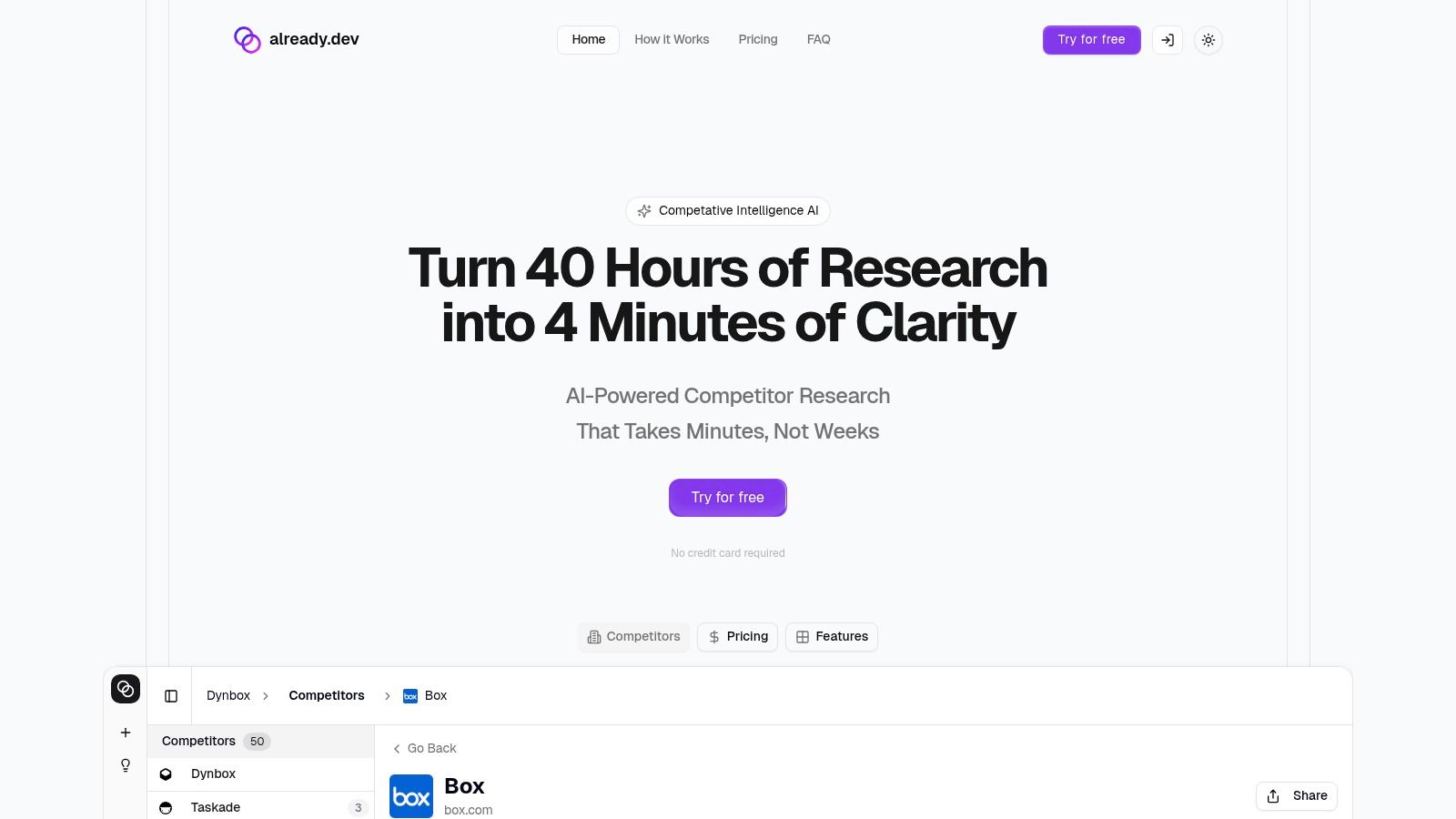
What makes Already.dev so slick is where it looks for competitors. It goes way beyond a simple Google search, diving into app stores, Reddit, niche forums, and even directories of failed startups. This uncovers the "hidden" competitors that traditional methods miss. In under five minutes, you get a report that used to take a human 40+ hours to compile. That's just silly.
Why It’s Our Top Pick
Already.dev is built for speed and depth. It doesn’t just list competitors; it analyzes them. The platform spits out easy-to-read visual reports, including feature grids and pricing comparison tables, so you can see exactly how you stack up. This is a game-changer for founders and product managers who need to make smart decisions without getting lost in spreadsheets. It helps you validate an idea or pivot your strategy with confidence.
Key Features & Use Cases
- AI-Driven Research: Automates the whole discovery process, saving you an insane amount of time.
- Deep Source Analysis: Scans 200+ sources, including places like Reddit and startup graveyards, to find rivals you never knew you had.
- Visual Competitive Reports: Delivers insights through feature grids and pricing tables that make complex data easy to digest.
- Smart Keyword Insights: Uncovers the actual terms customers are using to search for solutions like yours.
Pricing
Already.dev uses a flexible, credit-based system. You can sign up for a free trial to test it out, and then purchase credits as you go. This model is great for startups who don't want to get locked into a pricey monthly subscription like you'd find with giants like Semrush or Ahrefs.
Pros & Cons
| Pros | Cons | | --------------------------------------------------------------------------------------------------------------------------------- | --------------------------------------------------------------------------------------------------- | | Saves massive amounts of time, turning weeks of research into minutes. | Heavy users might find credit costs add up, so planning report usage is key. | | Uncovers hidden competitors from sources most people overlook. | API access is still in development, which might be a temporary drawback for fully automated workflows. | | Provides actionable, visual reports that make strategic decision-making easier. | | | Flexible pay-as-you-go pricing makes it accessible without a hefty monthly commitment. | |
2. Semrush
If you’ve been in the digital marketing world for more than five minutes, you’ve heard of Semrush. It's the Swiss Army knife of SEO and PPC. It's a massive, all-in-one suite that lets you spy on pretty much every aspect of your competitors' online strategy, from their organic keywords to their paid ad copy. It's also pretty expensive, so hold onto your wallet.
The sheer breadth of its data is what makes it stand out. You can plug in a competitor's domain and instantly see their estimated traffic, top-ranking keywords, and advertising spend. The Keyword Gap and Backlink Gap tools are killer, showing you exactly where your rivals are outmaneuvering you.
Why It’s a Top Pick
Semrush is especially powerful for digging into paid advertising strategies. You can see the exact ad copy competitors are running and their estimated PPC budget. This is invaluable for understanding their messaging. While it gives you all the raw data you could ever want, more focused tools like Visit Already.dev can help you make sense of it faster.
> Key takeaway: Semrush is an industry-standard powerhouse for deep-diving into competitor SEO and PPC playbooks, offering a massive dataset that’s hard to beat.
- Ideal For: Marketers who need a comprehensive tool for both organic and paid competitor research.
- Pros: Enormous toolset, excellent for PPC ad research, strong US data coverage.
- Cons: It's expensive, with plans starting at over $129/month, and the price climbs fast. The interface can also feel overwhelming.
Website: https://www.semrush.com
3. Ahrefs
If Semrush is the Swiss Army knife, Ahrefs is the finely crafted katana of SEO. It's famous for having one of the best backlink indexes on the planet, making it an absolute monster among the best competitor analysis tools. It deconstructs a competitor’s organic search strategy with breathtaking clarity. Like Semrush, it can be expensive.
What makes Ahrefs special is its laser focus on actionable SEO data, presented through a clean interface. The Site Explorer tool is the heart of its features, allowing you to plug in any URL and immediately see its organic traffic and top pages. The Content Gap tool is a goldmine, showing you keywords that your competitors rank for but you don't.
Why It’s a Top Pick
Ahrefs' superpower is its link data. No other tool provides such a deep and accurate view of a competitor's backlink profile. You can see not just who links to them, but also which pages are attracting the most valuable links. While powerful, tools like Ahrefs can get expensive, so if you're looking for a more accessible alternative, a tool like Visit Already.dev might fit the bill.
> Key takeaway: Ahrefs is the undisputed king of backlink analysis, offering unparalleled insights into a competitor's organic search performance and content strategy.
- Ideal For: SEO professionals and content marketers focused on organic growth and link building.
- Pros: Best-in-class backlink data, incredibly fast and intuitive user interface, excellent content gap analysis.
- Cons: It can be pricey for small teams, and there's no option to buy individual tools à la carte.
Website: https://ahrefs.com
4. Similarweb
While many tools zoom in on SEO keywords, Similarweb takes a step back to give you the 30,000-foot view of your competitor’s entire digital footprint. Think of it less as an SEO-specific tool and more as a digital market intelligence platform.
What makes it stand out is its focus on traffic estimation and channel breakdown. You can plug in a competitor’s URL and see where their visitors are coming from: direct, referral, search, social, etc. This is gold for understanding their marketing mix. Are they a social media powerhouse or a referral traffic machine? Similarweb provides the data to answer these strategic questions.
Why It’s a Top Pick
Similarweb is especially useful for benchmarking your performance against the broader market. You’re not just looking at keywords; you’re analyzing traffic trends and engagement metrics. This macro view is perfect for strategic planning. You can get similar high-level insights faster for specific product ideas with tools like Visit Already.dev.
> Key takeaway: Similarweb is the go-to for market-level intelligence, offering powerful insights into competitor traffic sources and overall digital strategy.
- Ideal For: Marketers and strategists needing to benchmark market share and analyze competitor marketing channels.
- Pros: Strong macro-level insights, great for understanding traffic sources, supports multi-competitor comparisons.
- Cons: Pricing is high, and key features are locked behind expensive enterprise-level plans.
Website: https://www.similarweb.com
5. SpyFu
If you're focused squarely on PPC, SpyFu is your secret weapon. While other tools like Semrush (which can be expensive) offer a massive buffet of features, SpyFu hyper-focuses on decoding your rivals' search marketing playbook without the hefty price tag.
Its main draw is the historical data. You can essentially travel back in time to see every keyword a competitor has bought on Google and every ad variation they've run for over 15 years. This isn't just a snapshot; it's a complete campaign history.
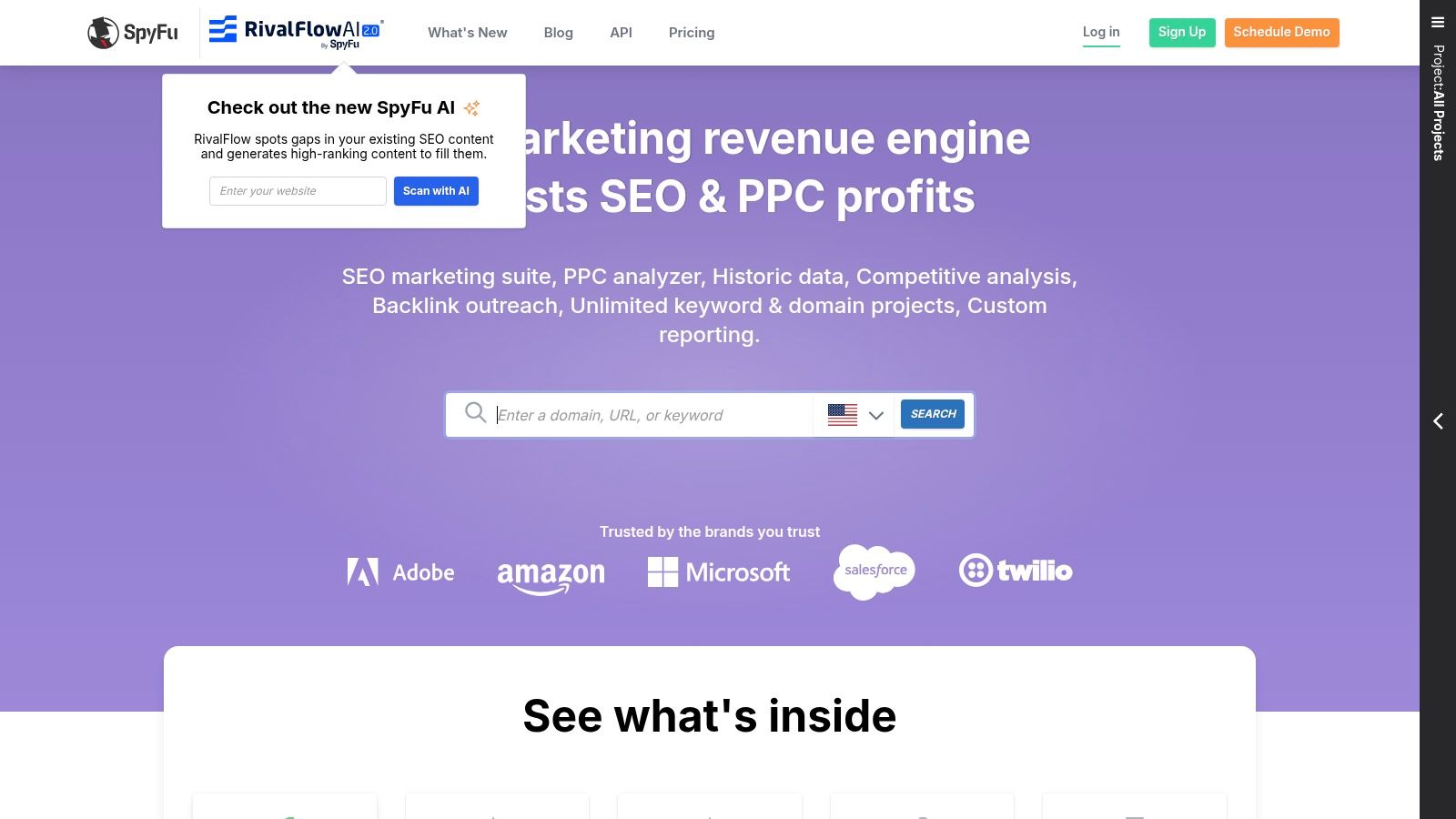
Why It’s a Top Pick
SpyFu's "Kombat" feature is a standout, letting you visually compare your domain against two competitors to see which keywords you share and which ones they rank for that you're missing. Unlike expensive all-in-one platforms, SpyFu is more accessible. For broader competitive discovery beyond just keywords, a tool like Visit Already.dev is a great complement.
> Key takeaway: SpyFu is a laser-focused and affordable tool for reverse-engineering competitor PPC and SEO keyword strategies with deep historical data.
- Ideal For: PPC managers and SMBs who need deep advertising intelligence without a massive budget.
- Pros: Very affordable for PPC research, unlimited data exports available, extensive history of ad copy and keyword data.
- Cons: The interface feels a bit dated, and its international data isn't as deep as what you'd find for the US market.
Website: https://www.spyfu.com
6. BuzzSumo
While many tools focus on technical SEO, BuzzSumo is all about content, PR, and social engagement. It helps you answer critical questions like: what content is resonating in my niche, and what topics are my competitors owning?
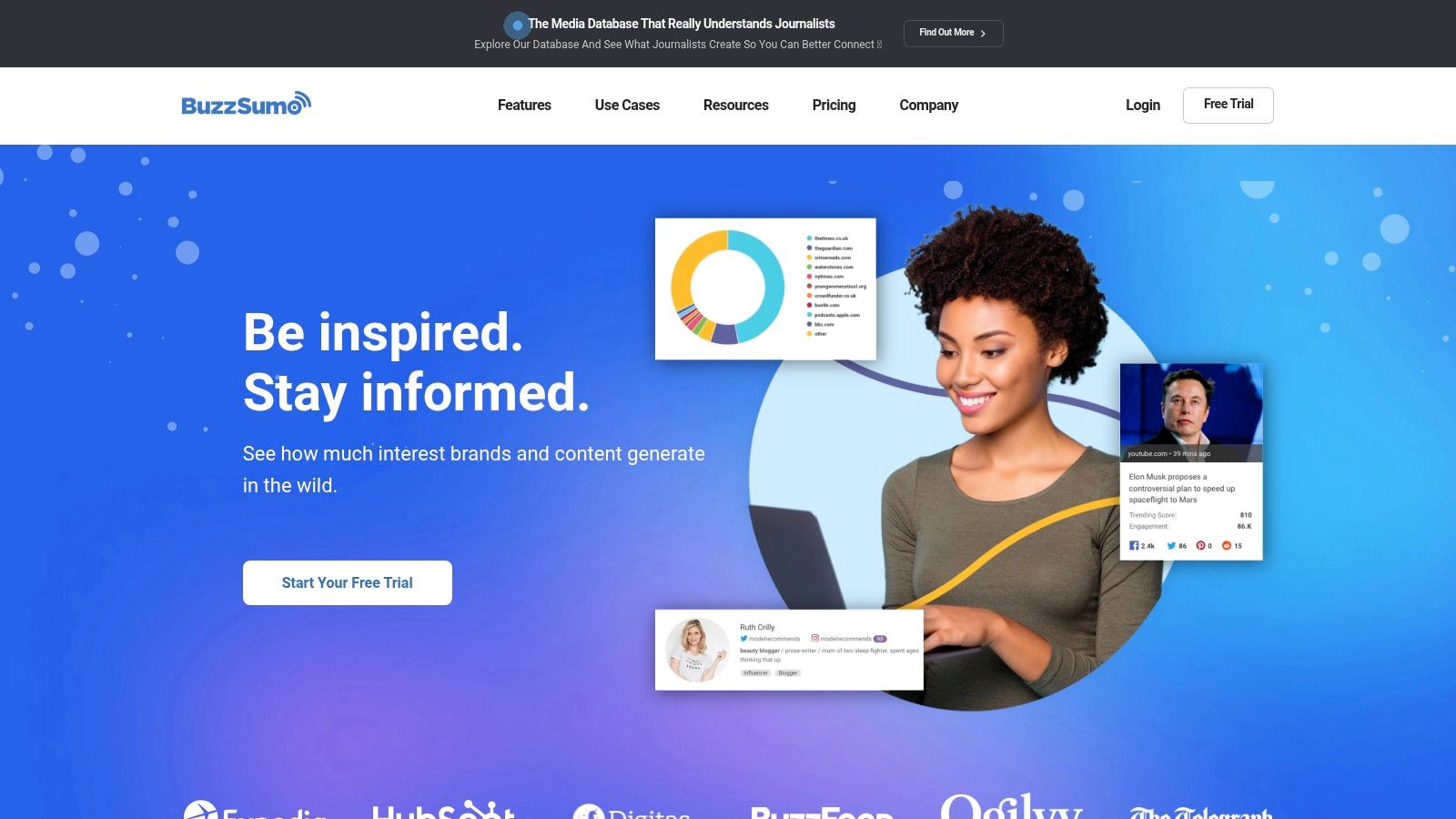
What makes it stand out is its focus on content performance. You can plug in a competitor's domain and see their most-shared articles across social networks. Even better, you can see who shared that content, giving you a ready-made list of influencers to target.
Why It’s a Top Pick
BuzzSumo is especially powerful for PR and content marketing teams. Instead of guessing what to write about, you can see exactly what formats and headlines are working for your competitors. It’s less of a full SEO suite and more of a specialized content intelligence platform. To find competitors to analyze in the first place, you might want to start with a tool like Visit Already.dev.
> Key takeaway: BuzzSumo is the go-to tool for deconstructing competitor content strategies, identifying winning topics, and finding the influencers who amplify them.
- Ideal For: Content marketers and PR professionals focused on creating high-engagement content.
- Pros: Excellent for content ideation and PR outreach, strong social media engagement data, clean interface.
- Cons: Not a full-blown SEO tool. The expensive plans from competitors like Ahrefs or Semrush offer more. Lower-tier plans have significant limitations.
Website: https://buzzsumo.com
7. Moz Pro
Moz Pro is a legendary name in the SEO world. It holds its own as one of the best competitor analysis tools, especially for those who find the data onslaught from platforms like Semrush or Ahrefs a bit much. It strikes a fantastic balance between powerful data and a user-friendly interface.
What makes Moz Pro stand out is its clarity. Its Link Explorer is a powerhouse for dissecting a competitor's backlink profile using its proprietary Domain Authority (DA) metric. The Keyword Gap feature is straightforward, showing you which keywords your competitors rank for that you don't.
Why It’s a Top Pick
Moz Pro is particularly valuable for teams just starting to get serious about competitor tracking. The interface is clean and the reports are easy to understand. While you can always find leaner, startup-focused tools like Visit Already.dev, Moz Pro offers a well-rounded suite.
> Key takeaway: Moz Pro is the ideal entry point into serious competitor SEO analysis, offering robust, easy-to-digest data without the overwhelming complexity of larger, more expensive platforms.
- Ideal For: Small to medium-sized businesses and marketing teams looking for a user-friendly yet powerful SEO toolkit.
- Pros: Very intuitive interface, strong link analysis metrics (DA/PA), excellent educational content.
- Cons: Data depth can sometimes lag behind more expensive competitors like Ahrefs. The more affordable plans have fairly restrictive limits.
Website: https://www.moz.com/products/pro/pricing
8. BuiltWith
Ever wonder what’s going on under your competitor's hood? BuiltWith tells you exactly that. It reveals the entire technology stack a website is built on, from their CMS to their advertising tools.
What makes BuiltWith so unique is its focus on technology adoption. You can see not just what tools a competitor is using now, but what they used in the past. Did they just switch from HubSpot to Marketo? That’s a massive strategic signal.
Why It’s a Top Pick
BuiltWith is a goldmine for sales and B2B marketing teams. You can generate lists of every website using a specific technology for targeted prospecting. Seeing a rival adopt a new A/B testing platform signals their future priorities. For a more holistic view that combines tech with market positioning, you could pair it with a tool like Visit Already.dev. You can also learn more about how this fits into a broader website competitive analysis.
> Key takeaway: BuiltWith offers a unique X-ray view into a competitor’s technology stack, revealing their software choices and priorities.
- Ideal For: Sales teams, B2B marketers, and strategists who need to understand a competitor's operational infrastructure.
- Pros: Unique data on technology adoption trends, excellent for sales prospecting, extensive dataset.
- Cons: It's not an SEO or content tool and must be paired with others. The entry-level pricing is higher than many specialized marketing tools.
Website: https://builtwith.com
9. Crayon
While many tools focus on SEO and ads, Crayon is built for a different, deeper level of competitive intelligence. It's less about tracking keywords and more about understanding your competitors' entire go-to-market strategy. Crayon is a full-stack intelligence platform that automatically captures everything from website changes and pricing updates to new messaging.
This isn't your typical SEO tool; it's designed to arm marketing and sales teams with real-time intel. Think of it as having a dedicated analyst team constantly watching every move your rivals make.
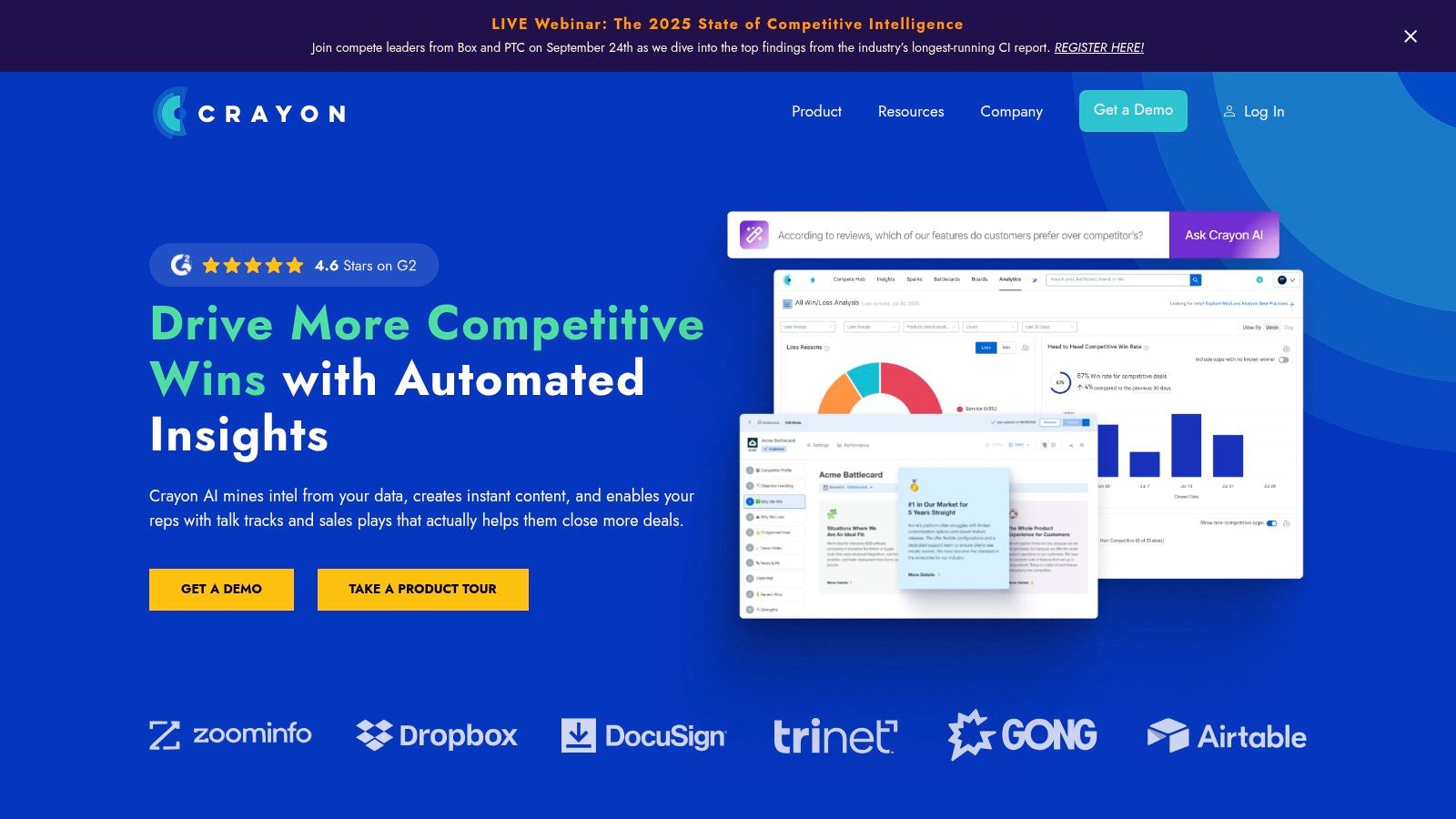
Why It’s a Top Pick
Crayon excels at turning raw data into actionable assets for sales teams. Its ability to create and distribute dynamic sales battlecards is a game-changer. When a competitor changes their pricing, the sales team knows immediately. If you need the initial competitive landscape to feed into a tool like this, Visit Already.dev can generate that for you.
> Key takeaway: Crayon is the go-to platform for enterprise-grade competitive intelligence, focusing on automating intel gathering and empowering sales teams.
- Ideal For: Mid-market to enterprise companies that need to operationalize competitive intelligence across marketing and sales.
- Pros: Scales exceptionally well, automated intel capture is a massive time-saver, strong focus on sales enablement.
- Cons: Pricing requires a direct sales call, which means it's likely a significant investment. Total overkill for startups.
Website: https://www.crayon.co
10. Kompyte
Kompyte, acquired by the (often expensive) Semrush, shifts the battlefield to sales enablement. It’s designed to arm your sales and product teams with the real-time intel they need to win deals by automating the tracking of competitors' websites, product changes, and messaging.
What makes Kompyte one of the best competitor analysis tools for sales is its workflow integration. It pushes timely alerts and updated battlecards directly into platforms like Slack and Salesforce. This isn't just about gathering data; it's about delivering it to the front lines when it's needed.
Why It’s a Top Pick
Kompyte is purpose-built to close the gap between marketing's research and sales' needs. It transforms competitive intelligence from a static report into a dynamic, living resource. While tools like Semrush give you the raw marketing data, Kompyte operationalizes it. For startups needing to build their first battlecards, Visit Already.dev can provide the initial feature and pricing comparisons.
> Key takeaway: Kompyte is the go-to platform for automating competitive intelligence and feeding your sales team the real-time intel they need.
- Ideal For: Sales enablement, product marketing, and CI teams focused on winning deals.
- Pros: Excellent automation and integrations, centralizes CI across the organization, directly supports sales workflows.
- Cons: Pricing is quote-based and requires an annual contract, making it a significant commitment.
Website: https://www.kompyte.com
11. Owler
While tools like the expensive Semrush and Ahrefs focus on what your competitors are doing online, Owler tells you what they are being as a company. It’s less about keyword rankings and more about corporate-level intelligence, tracking news, funding rounds, and leadership changes.
Think of it as your private investigator for competitor news. You can "follow" any company and receive daily email digests on their significant moves. This is killer for sales or strategic teams who need to stay ahead of market-shifting events.
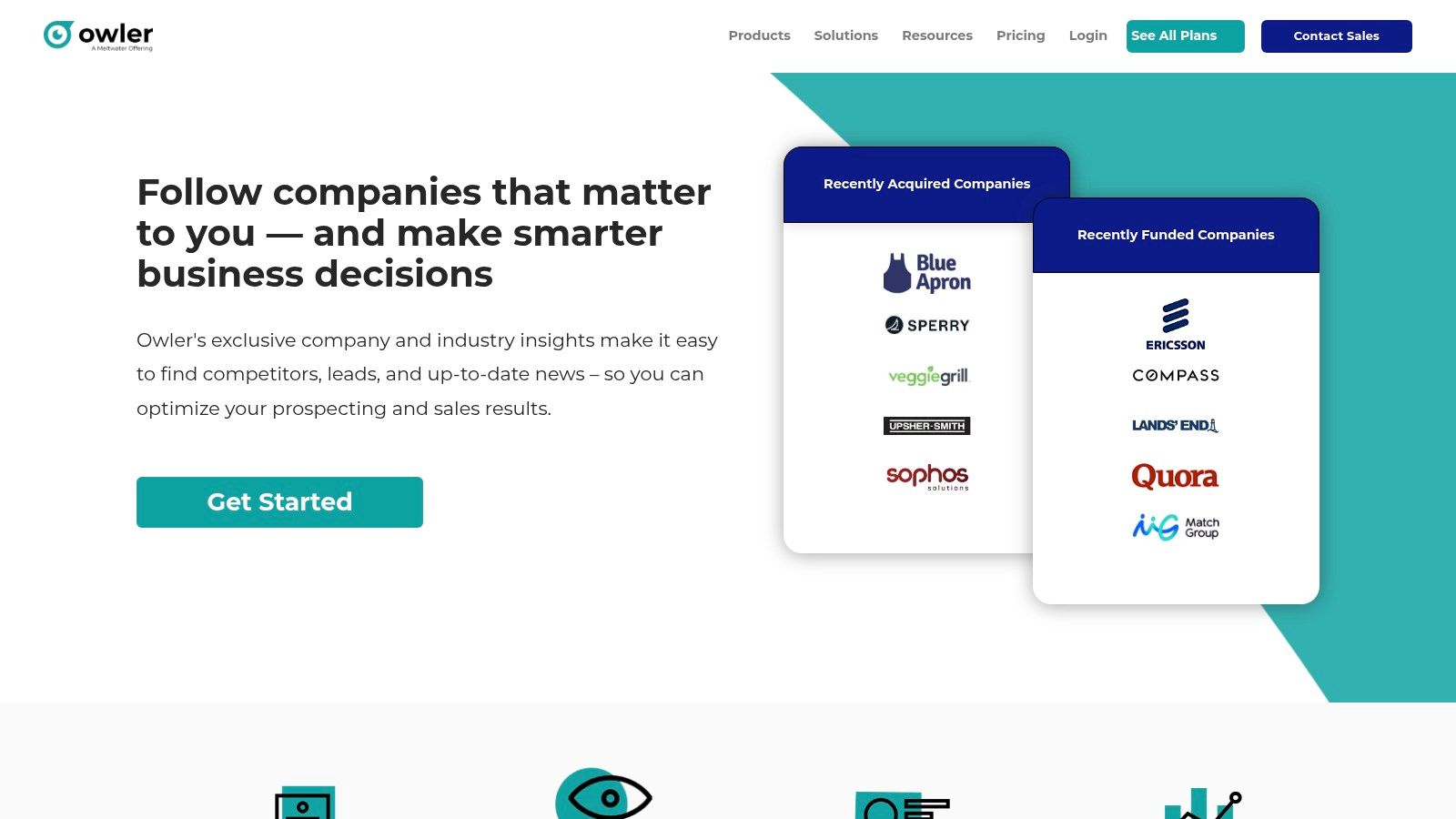
Why It’s a Top Pick
Owler's strength lies in its simplicity. Its "Competitor Graph" is a fantastic feature that visually maps out competitors, helping you discover rivals you might not even know you had. Instead of getting bogged down in marketing metrics, you get actionable business intelligence. For a more automated way to find competitors, you could also use Visit Already.dev.
> Key takeaway: Owler is your go-to source for real-time business intelligence, keeping you updated on your competitors' funding, acquisitions, and major news.
- Ideal For: Sales teams and founders who need to monitor the corporate health of their competitors.
- Pros: Simple and affordable way to monitor company-level news, excellent for discovering new competitors, affordable Pro pricing.
- Cons: Data depth can be inconsistent since it's crowdsourced; it’s best used as a complement to other tools.
Website: https://www.owler.com
12. G2 - Competitive Intelligence Software Category
Sometimes, the best tool isn't a single platform but a meta-resource to find the right platform. G2 is a massive software marketplace where real users leave reviews, and its Competitive Intelligence Software category is a goldmine. It's less about raw data and more about crowdsourced wisdom.
What makes it stand out is that you're getting peer-to-peer insights instead of just marketing copy. You can filter tools by features and pricing to find a shortlist tailored to your needs. This is the perfect starting point before you commit to expensive subscriptions for tools like Ahrefs or Semrush, or if you're looking for alternatives like Visit Already.dev that might not have a massive marketing budget.
Why It’s a Top Pick
G2 is incredibly powerful for due diligence. You can read detailed user reviews and get a feel for a tool's user experience and customer support quality without spending a dime. The side-by-side comparison feature lets you stack up your top contenders on a single screen.
> Key takeaway: G2 is the ultimate validation resource, providing unbiased user reviews to help you choose the right competitor analysis software.
- Ideal For: Teams in the evaluation phase, looking to compare multiple tools and validate vendor claims with real-world user feedback.
- Pros: Independent user reviews provide honest feedback, great for shortlisting tools, and it's free to browse.
- Cons: Review samples can sometimes be small or skewed, and pricing information is often incomplete.
Website: https://www.g2.com/categories/competitive-intelligence
Top 12 Competitor Analysis Tools Comparison
| Platform | Core Features & Capabilities | User Experience & Quality ★ | Value & Pricing 💰 | Target Audience 👥 | Unique Selling Points ✨ | |--------------------------|---------------------------------------------------------------------|-----------------------------------|------------------------------------|-----------------------------------------------|------------------------------------------------| | 🏆 Already.dev | AI-driven competitive research; scans 200+ sources beyond Google | ★★★★★ Fast, automated, visual reports | Flexible credit plans + free trial | Entrepreneurs, investors, product teams | Discover hidden competitors; smart keyword insights; 4-min reports | | Semrush | SEO, PPC, domain comparison, traffic analytics | ★★★★ Robust, steep learning curve | High, scales with users & add-ons | SEO pros, marketers, agencies | All-in-one SEO/paid intelligence suite | | Ahrefs | Backlink analysis, Site Explorer, keyword/content gap tools | ★★★★ Intuitive & fast | Mid-high, no à la carte tools | SEO specialists, content marketers | Extensive backlink index; AI add-ons | | Similarweb | Traffic & audience insights; marketing channel analysis | ★★★★ Macro-level, strong visuals | Higher than SEO-only tools | Market analysts, enterprises | Market share benchmarking; multi-property comparisons | | SpyFu | PPC & SEO competitor keywords, ad history, domain exports | ★★★ Utilitarian interface | Affordable, unlimited exports on Pro | PPC marketers, small-medium businesses | Historical PPC data; unlimited exports | | BuzzSumo | Content/PR analysis, influencer discovery | ★★★★ Content-focused, social insights | Mid-tier, limited lower-tier features | PR, content, social media teams | Content engagement tracking; influencer outreach | | Moz Pro | Rank tracking, keyword research, link analysis | ★★★ User-friendly, solid for beginners | Mid-tier, higher tiers for big teams | SEO beginners and teams | Balanced usability with feature breadth | | BuiltWith | Tech stack lookup, historical trends, lead lists | ★★★★ Data-rich, exportable | Higher entry price | Sales, ABM, tech analysts | Unique competitor tech insights | | Crayon | Unlimited tracking, automated competitor intel, battlecards | ★★★★ Scalable, team-focused | Custom pricing, sales engagement | Mid-market/enterprise marketing & sales | Full-stack CI with sales enablement | | Kompyte | Automated tracking, battlecards, CRM integrations | ★★★ Automation centric | Custom quotes, annual contracts | Sales & product marketing teams | Broad integrations; centralized CI workflows | | Owler | Competitor news alerts, company profiles, competitor graph | ★★★ Simple, affordable | Low-mid range, Pro & Teams tiers | General business users, individual professionals | Crowdsourced company intel; daily alerts | | G2 | User reviews, side-by-side comparisons, pricing filters | ★★★★ Trusted user feedback | Free to browse | Buyers researching CI tools | Independent reviews; detailed category insights |
So, Which Spy Tool Should You Choose?
Alright, we’ve just parachuted you into a warzone of competitive intelligence, armed with a dozen different spy gadgets. You're probably sitting there thinking, "Great, now I have more choices to make." And you're not wrong. But paralysis by analysis is the enemy.
The biggest mistake you can make is doing nothing. The second biggest is paying a small fortune for a tool that's total overkill. The goal isn't to buy the most expensive option; it's to find the one that fits your mission.
The No-Nonsense Way to Pick Your Weapon
Let's simplify this. Your choice boils down to answering a few honest questions.
-
What's Your Budget Reality? Let's be real. Tools like Semrush and Ahrefs are powerful, but their price tags are insane for a startup. If your budget is tight, your decision is practically made for you. You need a tool that delivers high value without the high cost, which is where a focused platform like Visit Already.dev shines. Don’t sign a massive annual contract for a bazooka when all you need is a slingshot.
-
What's Your Core Mission? Are you trying to outrank a competitor on Google? Or are you trying to figure out which features to build next? An SEO tool is useless if your main goal is product intelligence.
- For SEO & Content: Ahrefs, Semrush, Moz Pro, and SpyFu are your go-to options.
- For Market & Traffic Intel: Similarweb and Owler give you that high-level view.
- For Product & Feature Tracking: This is the critical battlefield for SaaS. Tools like Crayon help, but a specialized tool like Visit Already.dev is built from the ground up for this.
- For Tech Stack Snooping: BuiltWith is your undisputed champion.
-
How Much Time Do You Actually Have? A platform like Semrush is amazing, but it requires a significant time investment to master. If you're a founder wearing multiple hats, you need a tool you can get insights from in 10 minutes and get out. Simplicity is speed. Don't choose a tool that requires you to hire a specialist just to run it.
Your Action Plan: Stop Reading, Start Doing
Reading articles about the best competitor analysis tools is a great first step, but it doesn't win you any customers. True competitive intelligence is an active, ongoing process.
Your next move is simple. Pick one or two tools from this list that seem like the best fit. Sign up for the free trial. Spend a single afternoon plugging in your top three competitors and see what you find. Don't try to boil the ocean. Just look for one actionable insight—one keyword to target, one feature gap to exploit, one marketing channel you've overlooked.
That one small win is infinitely more valuable than a dozen more hours of research. You'll learn more by doing than by reading. So go on, pick your tool, and start spying. Your competitors already are.
Ready to get straight to the insights that matter? Start tracking your competitors for free at Already.dev.